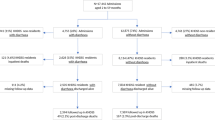Abstract
After recovery from persistent diarrhea, some children have recurrent episodes of diarrhea and associated problems. We undertook this study to identify the risk factors responsible for this relapse. All patients reporting at 1 month follow up since discharge, with >7 diarrheal days, or inadequate weight gain compared to the weight at discharge, constituted the failure group. All others constituted the non-failure group. Various risk factors were studied in 21 cases (failure group), and 42 controls (non-failure group). Univariate analysis revealed a significant association of hospital stay <5 days (OR 10.6; 95% Cl 3.13–36), working mothers (OR 8.5; 95% Cl 2.5–27), poor socioeconomic status (OR 4.5; 95% Cl 1.4–14) and presence of younger sibling (OR 3.69, 95% Cl 1.1–12.6) with failed outcome. On logistic regression analysis, only hospital stay <5 days (OR 11.7; 95% Cl 1.02–134.68) and female children (OR 17.65; 95% Cl 1.26–246) remained significant. We therefore conclude, that a short hospital stay, limited optimal contact and limited health education adversely affects the outcome. Pediatricians should be more cautious while managing female children.
Similar content being viewed by others
References
World Health Organization. A manual for the treatment of diarrhea. Geneva: WHO 1990.
Bhan MK, Bhandari N, Sazawal Set al. Descriptive epidemiology of persistent diarrhea in rural northern India.Bull WHO 1989; 67(3):281–288.
Deivanayagam N, Mala N, Ashok TP, Ratnam SR, Sankaranarayanan VS. Risk factors for persistent diarrhea among children under two years of age: Case control study.Indian Pediatr 1990; 36:177–185.
Alam S, Ahmed SH, Lamba IMS. Clinical profile of persistent diarrhea in a DTTU.Indian Pediatr 1997; 34: 631–635.
Sibal A, Patwari AK, Anand VKet al. Associated infections in persistent diarrhea — another perspective.J Trop Pediatr 1996; 42:64–67.
Abstracts from WHO Programme for Control of Diarrheal Diseases.Indian J Pediatr 1989; 56:545–548.
Shahid NS, Sack DA, Rehman Met al. Risk factors for persistent diarrhea.BMJ 1988; 297:1036–1038.
Chandra J, Ahmed SH. Prasad's social classification of Indian families updated.Indian Pediatr 1987; 24: 689–690.
McAuliffe JF, Shields DS, Desousa MAet al. Prolonged and recurring diarrhoea in the North East of Brazil: Examination of cases from a community based study.J Pediatr Gastroenterol Nutr 1986; 5:902–905.
Sazwal S, Bhan MK, Bhandari Net al. Evidence of recent diarrheal morbidity as a risk factor for persistent diarrhea.Int J Epidemiol 1991; 20(2):540–545.
Moy RJD, Booth IW, Choto RGAB, Mcneish AS. Recurrent and persistent diarrhea in a rural Zimbabwean community: A prospective study.J Trop Pediatr 1991; 37:293–299.
Author information
Authors and Affiliations
Corresponding author
Rights and permissions
About this article
Cite this article
Alam, S., Ashraf Malik, M. Outcome of cases of persistent diarrhea after discharge. Indian J Pediatr 67, 334–336 (2000). https://doi.org/10.1007/BF02820680
Issue Date:
DOI: https://doi.org/10.1007/BF02820680




